Pet Wellness Services
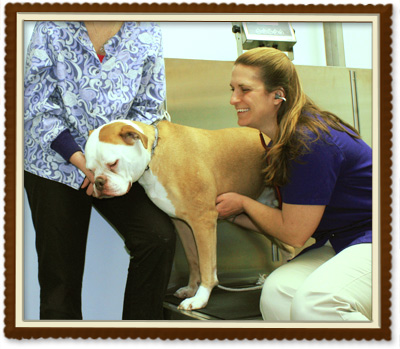 Wellness Care for Your Auburn, NH Pet
Wellness Care for Your Auburn, NH Pet
"An ounce of prevention..."
Remember the old saying, "An ounce of prevention is worth a pound of cure"? It is as true for the health of your pet as it is for any member of your family!
Annual health examinations at our Auburn animal hospital help us establish the general well-being of your pet and identify potential problems. Early detection ensures prompt treatment that can solve problems before they become serious and minimize any potential stress and suffering.
The staff at Tower Hill Animal Hospital is here to support your family member (large or small) no matter what the issue, and our passion is to keep your pet healthy.
Your Pet's Lifetime Wellness Plan
The staff at Tower Hill Animal Hospital in Auburn, NH is committed to providing comprehensive and individualized medical care that enhances your pet's well-being and quality of life. As medical professionals, we recognize that in order to provide your pet with a long and happy life as well as to limit the lifetime cost of care for your pet, our focus must be on preventive care. This is why when you come to Tower Hill Animal Hospital we work with you to create a lifetime preventive health care plan for your special friend.
The basis of such a plan should be regular wellness examinations that include thorough screenings for a number of common diseases and ailments that could affect your pet's health. As your pet enters his or her senior years these screenings become even more important, which is why we have developed a customized senior wellness protocol.
We also recommend a balanced schedule of vaccines to protect your pet from a range of dangerous, but preventable diseases. Routine dental care is part of the plan as well, because good oral health goes a long way toward protecting overall systemic health. Beyond these standard elements of good preventive care, we also offer microchip identification in case your pet should become lost, nutritional and behavioral counseling, internal medicine services, soft tissue and orthopedic surgery, advanced diagnostic testing capabilities, and much more.
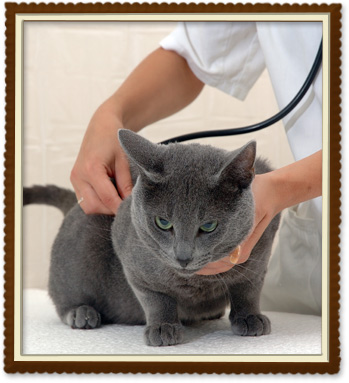 Perhaps the most important piece of your pet's care is strong client/doctor communication. It is important that we hear from you about how your pet is doing and that you voice any concerns you may have so together we can continuously adjust and optimize your pet's health care plan. It is also our responsibility to empower you with the information necessary to provide the best and most compassionate home-based care for your pet. We believe that our breadth and depth of medical knowledge is of little use if we do not share it with you.
Perhaps the most important piece of your pet's care is strong client/doctor communication. It is important that we hear from you about how your pet is doing and that you voice any concerns you may have so together we can continuously adjust and optimize your pet's health care plan. It is also our responsibility to empower you with the information necessary to provide the best and most compassionate home-based care for your pet. We believe that our breadth and depth of medical knowledge is of little use if we do not share it with you.
Unfortunately, despite even the best preventative health care plan, your pet may experience an illness or injury. The skill, experience, and extensive education of our staff allow us to effectively manage complex medical and surgical challenges.
Our level of expertise, capabilities, and resources also reduces the frequency of referrals to specialists and allows your pet to receive care from people you know, in a comfortable and familiar setting.
Please take a look at the services offered at Tower Hill Animal Hospital and why we believe they are important for the care of your pet. Then feel free to give us a call at (603) 483-4050 to make an appointment or email us for more information.
Your Pet's Wellness Exams: Nose to Tail Care
Routine examinations at Tower Hill Animal Hospital provide you and Dr. Bright with the opportunity to develop a picture of your pet's overall health as well as to spot potential medical issues before they become serious health concerns. It's also an opportunity for you to ask us important questions about your pet's health, habits, and daily care. We also use this time to inform you about home healthcare for your pet and offer important advice and new information on the care of your particular type and breed of animal.
Dr. Bright and our veterinary staff recommend a complete nose-to-tail physical examination at least once a year, though more frequent exams are encouraged.
During your pet's wellness checkup, Dr. Bright will:
Listen to your pet's heart - Early signs of cardiac disease such as heart murmurs and abnormal heart beat patterns known as arrhythmias can be heard through a stethoscope. Discovering these initial indicators of an underlying condition will lead to treatment before it becomes a more serious health threat.
Listen to your pet's lungs - Health issues such as infections, obstructive diseases and other problems can be detected by listening to your pet's lungs through a stethoscope. The doctor can also assess the overall pulmonary health of your pet.
Check your pet's teeth and oral cavity - Infections and other forms of dental disease can lead to very serious systemic health issues, such as liver, kidney, or heart disease. We also take the time to discuss proper home dental care with you.
Evaluate your pet's vision - Ocular conditions, such as glaucoma, corneal ulcers and dry eye, can be prevented or better treated through regular care and screenings.
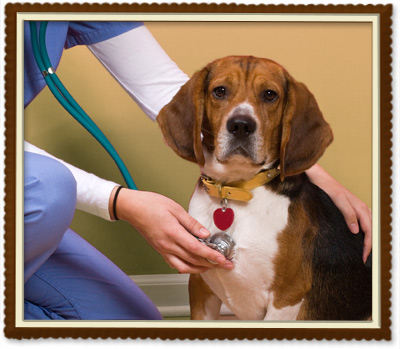 Look into your pet's ears - Ear disease is relatively common in many types of pets. Regular examinations can prevent most forms of ear disease from developing or stop its progression.
Look into your pet's ears - Ear disease is relatively common in many types of pets. Regular examinations can prevent most forms of ear disease from developing or stop its progression.
Palpate the lymph nodes, abdomen and skin - By feeling these areas, we are looking for unusual lumps or swellings. The skin is also evaluated for discolorations, lesions or patterns of hair loss or thinning, which could be signs of more complicated health issues.
Palpate joints and muscles - By examining the joints, legs and other areas of the body, we are able to evaluate for swelling, decreased muscle tone and variations in muscle size that may indicate developing orthopedic issues. In older pets, we look for signs of arthritis, which can be treated if found early.
Lab work - A complete physical exam includes a heartworm test and on occasion, other blood tests. A chemistry panel and blood count can screen for the presence of underlying disease processes and create a baseline should your pet become ill between routine examinations.
Parasite Testing - Checking your pet for intestinal parasites is an important component of any preventive care plan for your pet and your family. For example, parasites such as hookworms and roundworms are considered zoonotic, which means they can affect humans too.
At home, watch for subtle changes in your pet's body weight, appetite, water intake, urination and bowel habits, as well as general attitude and activity level. These changes may be signs of medical problems. Lumps and bumps under the skin may seem harmless, but can be cancerous. Ear infections, abscessed teeth and gum disease are common, painful conditions that may not become obvious until seriously advanced. A comprehensive physical exam is the tool to evaluate your dog's, cat's, or other pet's health status and to help you make informed decisions about the care of your special companion.
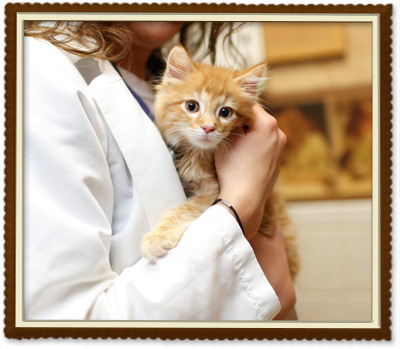 Puppy and Kitten Care
Puppy and Kitten Care
Bringing a new puppy or kitten into your home is always something to celebrate. They add energy and fun and are a source of unceasing affection as they bond with you and your family.
However, new pets require a little extra attention to ensure they get a good, healthy start at life. This means that comprehensive physical exams from Dr. Bright at Tower Hill Animal Hospital at key developmental stages are essential. Any time that you get a new pet, it's important to schedule an appointment right away so that we may review their prior medical records and make timely recommendations for appropriate wellness care.
Your first visits with your new puppy or kitten at Tower Hill Animal Hospital are perhaps the most important. These initial visits are where you, Dr. Bright, and your pet first meet and begin to form the relationship that lasts throughout the life of your pet. We take plenty of time with these visits to give your puppy or kitten a thorough examination, talk with you about concerns you may have, offer health care and training advice, and more.
Some of the issues discussed during your kitten's first visits include:
- Diet (including types of food that are best for your cat's unique requirements)
- Litter and litter box use
- Behavior
- Should my cat be allowed to go outdoors?
- Flea and tick prevention
- Spaying and neutering recommendations
- Declawing: Should I or shouldn't I?
- Vaccine protocol
- Pet health insurance: Should I get pet health insurance? What should I look for in a company?
- Microchipping: Should I get this done? When is the best time to do this?
- Fecal exam and treatment for worms and other intestinal parasites
- Testing for Feline Leukemia Virus (FeLV) and Feline Immunodeficiency Virus (FIV)
- Complete physical exam which includes detection of potential congenital problems and anything else you may want to discuss.
Some of the issues discussed during your puppy's first visits include:
- Diet (including types of food to feed and guidelines on feeding intervals and quantities)
- Housetraining
- Behavior
- Spaying and neutering advice: Is this best for my dog? If I decide to spay/neuter, when is the best time to have this done?
- Formulation of an individualized vaccine protocol.
- Pet health insurance: Should I get pet health insurance? What should I look for in a company?
- Discussion about heartworm, fleas, and ticks
- Microchipping: Should I get this done? When is the best time to do this?
- Fecal exam and treatment for worms and other intestinal parasites
- Complete physical exam which includes detection of potential congenital problems and anything else you may want to discuss.
Tower Hill Animal Hospital's veterinary staff takes plenty of time during these visits to give your puppy or kitten a thorough examination, which includes detection of potential congenital problems, offer health care and training advice, and talk with you about any concerns you may have. This is your new kitten or puppy! We're happy to answer all of your questions and get you started off on the right foot with your new friend.
Vaccines
Today, many immunizations and preventative treatments are available that did not exist a decade ago. Due to the many recent discoveries and innovations in veterinary medicine, your pet can be protected against most major infectious diseases.
Vaccines are useful in preventing Canine Distemper, Parvovirus, Bordetella, Rabies, Lyme disease, and other diseases in your dog and Feline Leukemia, Panleukopenia, and Rabies in cats. Our staff at Tower Hill Animal Hospital can assist you in deciding which preventive measures are necessary for your pet.
Up-to-date vaccinations play a large part in keeping your pet healthy and free from disease. However, not every pet requires the same series or frequency of vaccines. Vaccine schedules are balanced to provide needed protection while not over-vaccinating your pet. Please contact us for more information about vaccinations.
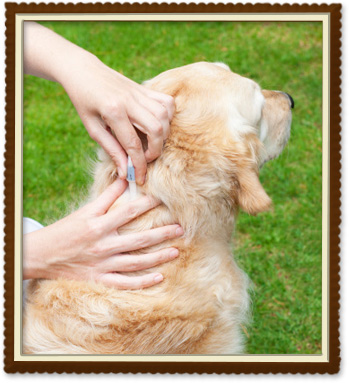 Core Vaccines
Core Vaccines
Puppy: Distemper, Rabies, Lyme, Bordetella, Leptospirosis Adult Dog: Distemper, Rabies, Lyme, Leptospirosis
Kitten: Distemper, Rabies, Feline Leukemia Adult Cat: Distemper, Rabies
Non-Core Vaccines
Adult Dog: Bordetella, Canine Influenza Adult Cat: Feline Leukemia
Flea and Tick Prevention
Fleas and ticks are more than a nuisance; they carry diseases dangerous to both you and your pet. Beginning in the spring, ticks emerge, bringing with them the threat of Lyme disease for both you and your pet. Signs of Lyme disease include lameness due to joint inflammation, loss of appetite, and depression. Ticks tend to thrive in wooded areas or in high grass. It is often difficult to keep your pets away from tick infested areas, so if they do go exploring, check them when they come inside. Although fleas are less of a concern in our area, they too can become a problem during the warm weather and, if left untreated, they can be a nuisance year-round.
Fortunately, flea and tick problems can be avoided by using parasite prevention products that are available at our hospital. When used properly and according to our directions, these products are very safe and effective. We also recommend all dogs be vaccinated against Lyme disease. If you suspect that your dog has Lyme disease, please schedule an appointment with us right away.
Heartworm Disease
Heartworm disease is a serious, life-threatening disease affecting dogs and, to a lesser extent, cats. Mosquitoes spread the disease by injecting the parasite into your pet at the time of their bite.
Clinical symptoms of heartworm disease develop very slowly. Lack of energy and exercise intolerance are early symptoms, as are coughing and difficulty breathing. Because heartworm disease is increasing in frequency and is a serious and deadly disease, we recommend that your dog be tested annually.
Heartworm disease prevention is simple and effective. For dogs, a once-a-month heartworm preventative can be given as a tasty, chewable treat. This same chewable medicine prevents not only heartworms from developing, but also kills and prevents most other types of worms that can infect your dog. Cats are protected by applying a drop of heartworm prevention liquid to the skin once-a-month. We recommend this to prevent heartworm disease as well as fleas, ear mites, and other types of worms that can infect your cat.
If you would like to have your pet tested for heartworm disease, or if you would like additional information on how best to protect your pet from this dangerous parasite, please call Tower Hill Animal Hospital today at (603) 483-4050 for an appointment.
 Allergies and Dermatology
Allergies and Dermatology
Allergies, ear infections, and skin problems can be frustrating to both you and your pet. If left untreated, allergy-related conditions can fester and become serious health concerns.
Therefore, it is important to be able to identify the first signs and symptoms of allergies and dermatological conditions. These include:
- Inflamed ears
- Hotspots, especially those that recur
- Scratching
- Rubbing the eyes or mouth area
- Flaking
- Lesions on the skin
- Hair loss
- Red itchy bumps on the skin
- Asthma-like wheezing or respiratory issues
These problems can indicate a serious dermatological or allergic reaction to allergens such as fleas, pollen, dust, and various foods. If you notice any of these symptoms, it is important that you bring your pet in to Tower Hill Animal Hospital for an evaluation. If left untreated, these problems can become severe medical concerns.
The veterinarians and staff at Tower Hill Animal Hospital take the time to explain your pet's condition, the proper method of treatment, and how to prevent future occurrences.
Exotic Animal Care

Tower Hill Animal Hospital is proud to offer optimum wellness care programs for exotic pets. We are happy to treat your guinea pigs, rats, rabbits, small rodents, ducks, and chickens. Since it is often difficult to determine if an exotic pet is ill, we recommend physical examinations once a year to check for health problems plus annual monitoring to check for nutritional and husbandry-related conditions.
In order to survive attacks from their predators, exotic animals normally conceal their illnesses in the wild. As a result, their medical problems often go unnoticed for long periods of time. By the time you recognize that there is a problem with your exotic pet, the condition is often extremely serious. With annual medical examinations by Dr. Bright at Tower Hill Animal Hospital, problems are often diagnosed before they become serious medical conditions.
After acquiring your new exotic pet, a complete wellness appointment is strongly recommended. This exam includes a thorough physical examination, husbandry and nutritional consultation, disease screening, and laboratory testing if necessary. Before bringing your pet into your home, you want to make sure that he or she is healthy.
If your exotic pet needs intensive care or hospitalization, you want to be sure that your veterinary hospital is specifically equipped to care for exotic species. Tower Hill Animal Hospital has the technology, training, and know-how necessary to treat your exotic pet.